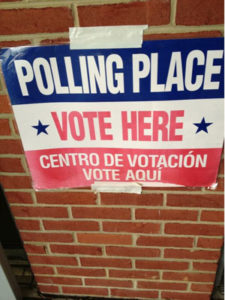It was in Miss Barbara Nelson’s first grade class at Stewart-Tuckahoe that I first learned that the choices I made could affect the world.

It was November of 1960, and Miss Nelson asked the class to put our heads on our desks and, by a show of hands, vote for President.
She called John Kennedy’s name first and being new to this form of civic engagement, I peeked and saw one of my friends raise her hand – I followed her lead. A moment later, Miss Nelson asked how many were voting for Richard Nixon. Again, I peeked, saw how a second friend was voting, and promptly committed voter fraud. Miss Nelson shared the results, acknowledged that there had been an error but decided against a recount. I was spared.
I can’t say that was the beginning of my social consciousness but I was very interested in politics and government throughout my years in public school and at age 18, voted for the first time in November, 1972. It was a thrill and a sign (along with getting a driver’s license) that I had reached adulthood.
I’ve never missed an election since and when my two sons were little, I took them with me to help me cast my ballot, their reward: red, white and blue “I Voted” stickers. Years later, one of those boys stood in line with me to help me cast my vote for the first African-American President. The enormity of that moment was not lost on either one of us.
It’s a point of pride that Central Library is one of many polling locations.
Not because we’re a big facility with a large auditorium and a lot of free parking, but because our very existence as the public library is predicated on a belief that people have a right to know.
Free and unfettered access to information makes our democracy work by giving people the tools they need to pursue the lives they imagined.
That is a sacred covenant that we, as librarians, never take for granted.
This election season has seemed exceptionally long and it’s no surprise that many (all?) of us are counting the days until it is over. To hasten its end (and it will end), however, is to pay insufficient attention to what voting is all about: taking a stand, making a commitment to oneself and others, being an active participant in the wider community.
Turn on the TV, open the newspaper, listen to the radio – we’re told that this election is more important than ever.
Not so. Every election is important and every vote counts. And it’s a privilege that for people in many parts of the world is not enjoyed.
On Tuesday, vote as if your life depends on it; it does.
Well said! I couldn’t agree more! Library staff are always so accommodating when the voting lines get so long.